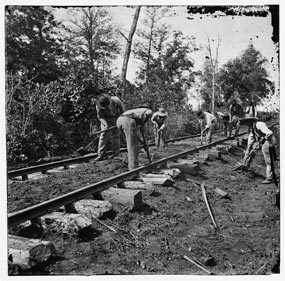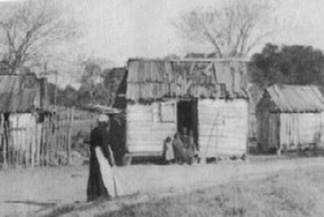Page 1 of the Emancipation Proclamation
"That on the first day of January, in the year of our Lord one thousand eight hundred and sixty-three, all persons held as slaves within any State or designated part of a State, the people whereof shall then be in rebellion against the United States, shall be then, thenceforward, and forever free; and the Executive Government of the United States, including the military and naval authority thereof, will recognize and maintain the freedom of such persons, and will do no act or acts to repress such persons, or any of them, in any efforts they may make for their actual freedom."
"And by virtue of the power, and for the purpose aforesaid, I do order and declare that all persons held as slaves within said designated States, and parts of States, are, and henceforward shall be free; and that the Executive government of the United States, including the military and naval authorities thereof, will recognize and maintain the freedom of said persons."
"And upon this act, sincerely believed to be an act of justice, warranted by the Constitution, upon military necessity, I invoke the considerate judgment of mankind, and the gracious favor of Almighty God."
By the President: ABRAHAM LINCOLN
* * * * * * * * * * * * * * * * * * * * * * * * *
One of the oldest dated documents that I have reflecting my ancestors is an estate inventory with the names of all of the slaves of Major John Bass. The document was created in 1860. These men, women and children ranged in age from 65 years of age to 2 months. In 1860 they were there together, enslaved, but thankfully, with time they were all freed.
Like my ancestors on other lines, freedom came to them in many ways. My uncles Sephus and Braxton joined the Union Army as well as Uncle Sephus' two sons. Mitchell was sent to Arkansas, and a daughter was eventually sent away from the family as well from the family unit before freedom finally came. Some freed themselves and others had to wait.
The Battle Hymn of the Republic by Julia Ward Howe
And so it came to be--the Proclamation was released and with time, freedom came to the land. Some were already free by January 1st, others had to wait for some time. But no matter how long they had to wait, they endured, remained faithful and resilient and found freedom!
On now that the day has come that this Proclamation is commemorated, I also commemorate those who toiled so long in bondage without hope and without joy! They kept their faith and were rewarded at long last! And for that I can rejoice and be glad!!!
One of the many copies of the proclamation made after January 1st 1863.
One of the oldest dated documents that I have reflecting my ancestors is an estate inventory with the names of all of the slaves of Major John Bass. The document was created in 1860. These men, women and children ranged in age from 65 years of age to 2 months. In 1860 they were there together, enslaved, but thankfully, with time they were all freed.
Estate Inventory of Major John Bass of Giles County Tennessee, 1860
Like my ancestors on other lines, freedom came to them in many ways. My uncles Sephus and Braxton joined the Union Army as well as Uncle Sephus' two sons. Mitchell was sent to Arkansas, and a daughter was eventually sent away from the family as well from the family unit before freedom finally came. Some freed themselves and others had to wait.
But when they were finally released from the yoke of bondage---it had to be a happy day, indeed!! As much as they had prayed for the day to come, finally freedom did come to them. All are honored, today simply because they endured. And because they endured, I am here today.
The symbol of their freedom is the Proclamation Released on this day January 1st.
Whatever day that my ancestors found freedom, I cherish the emotion that they must have felt! Their prayers had been answered. They must have believed that God finally had heard their pleas, and had washed way their sins for they had truly reached that Happy Day of Freedom.
Some could only watch as time brought freedom to them.
Some did fight for their freedom and won.
And all of them prayed that the day would come.
For all of them, no matter when, it was a Happy Day!
Statement Made by Congressman John Lewis in the Prologue
to the Commemoration Booklet of the Emancipation Proclamation































